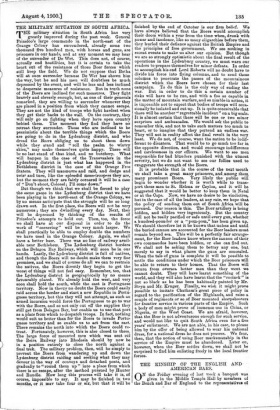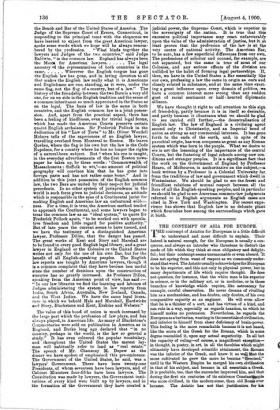THE KINSHIP OF THE ENGLISH AND AMERICAN BARS.
ON the Friday evening of last week a banquet was given in the Middle Temple Hall by members of the Bench and Bar of England to the representatives of the Bench and Bar of the United States of America. The Judge of the Supreme Court of Errors, Connecticut, in responding to the principal toast with the eloquence we have learned to expect from the great American lawyer, spoke some words which we hope will be always remem- bered by the profession. "What binds together the lawyers and Judges of the two countries," said Judge Baldwin, "is the common law. England has always been the Mecca for American lawyers The legal ancestry Pi the representatives of both countries' is the same. . . . . Wherever the English tongue has gone the English law has gone, and in loving devotion to all that makes the English law really what it is Americans and Englishmen are one, standing, as it were, under the same flag, not the flag of a country, but of a law." The history of the friendship between the two Bars is a very old one, for on no side is the English tradition and the sense of a common inheritance so much appreciated in the States as on the legal. The basis of law is the same in both countries, and the English common law is a joint posses- sion. And, apart from the practical aspect, there has been a feeling of kindliness, even for trivial legal forms, which has made the American Courts preserve certain quaint English archaisms. Sir Frederick Pollock in the dedication of his "Law of Torts" to Mr. Oliver Wendell Holmes tells of the experiences of an English lawyer, travelling overland from Montreal to -Boston. He leaves Quebec, where the flag is his own but the law is the Code Napoleon, for a country where he has no longer the rights of a natural-born subject. But "when his eye is caught, in the everyday advertisements of the first Boston news- paper he takes up, by these words : Commonwealth of Massachusetts : Suffolk to wit,'—no amount of political geography will convince him that he has gone into foreign parts and has not rather come home." And in addition to this joint possession of the English common law, the two Bars are united by their respect for judicial precedents. In no other system of jurisprudence in the world is such force given to judicial decisions, an attitude which is responsible in the eyes of a Continental jurist for making English and American law an unfeatured wade'. ness. For a time, it is true, the American method tended to approach the Continental, and some lawyers began to treat the common law as an "ideal system," to quote Sir Frederick Pollock again, "to be worked out with specula- tive freedom and little regard for positive authority." But of late years the current seems to have turned, and we' have the testimony of a distinguished American lawyer, Professor Dillon, that the danger has passed. The great works of Kent and Story and Marshall are to be found in every good English legal library, and a great lawyer in England or the Colonies or the United States writes not only for the use of his own Bar, but for the benefit of all English-speaking peoples. The English law reports are bought by American lawyers, though it is a common complaint that they have become less useful since the number of decisions upon the construction of statutes has so greatly increased. As Professor Dillon, speaking from the American point of view, has said :— "In our law libraries we find the learning and labours of Judges administering the system in law reports from India, South Africa, Australia, New Zealand, Canada, and the West Indies. We have the same legal litera- ture in which we behold Hale and Marshall, Hardwicke and Story, Blackstone and Kent, Erskine and Webster."
The value of this bond of union is much increased by the large part which the profession of law plays, and has always played, in American life. As many of Blackstone's Commentaries were sold on publication in America as in England, and Burke long ago declared that "in no country, perhaps in the world, is the law so general a study." It has even coloured the popular vocabulary, and throughout the United States the merest lay- Man will habitually refer to land as "real estate." The speech of Mr. Chauncey M. Depew "at the dinner we have spoken of emphasised this pre-eminence. The Government of the United States, he said, was a lawyers' Government. There have been twenty-one Presidents, of whom seventeen have been lawyers, and of Cabinet Ministers four-fifths have been lawyers. The Constitution was made by lawyers, the Government insti- tutiOns of every kind were built up by lawyers, and in the formation of the Government they have created a judicial power, the Supreme Court, which is superior te the sovereignty of the . nation. It is true that this excessive political importance may react unfavonrably upon the value of the administration of justioe, but it it least proves that the profession of the law is at the very centre of national activity. The American Bar, to be sure, has a few superficial differences from our own. The professions of solicitor and counsel, for example, are not separated, but the same is true of most of out- Colonies, and any serious effects of the division are nullified by the habit of forming legal partnerships. If, then, we have in the United States a Bar essentially like our own, professing a law the same in origin as ours and closely related in substance, and at the same time exert- ing a great influence upon every domain of politics . we have a common interest more strong than any sudden gust of racial sentiment or half - hearted diplomatic alliance.
We have thought it right to call attention to this sign of friendship, partly because it is in itself so desirable, and partly because it illustrates what we should be glad to see carried still further,—the decentralisation Of English law. The law of England is a civilising agent second only to Christianity, and an Imperial bond of union as strong as any commercial interests. It has gone forth to the ends of the earth, and, in spite of its parochial origin, has won conquests as great as any Roman system which was born in the purple. What we desire to see is not the lessening of the importance of the central Courts, but the fostering of legal schools among new con- ditions and stranger peoples. It is a significant fact that the work on the Government of England by Professor Hearn, of Melbourne, is authoritative on the subject,—a book written by a Professor in a Colonial University far. from the traditions of law and government which dwell in Westminster. We should be. glad to see the freest and friendliest relations of mutual respect between all the Bars of all the English-speaking peoples, and in particular we should be glad to see American common-law judgments referred to in English arguments as English cases are cited in New York and Washington. For recent expe- rience has shown that English law is no delicate plant which flourishes best among the surroundings which gave it birth.



































 Previous page
Previous page